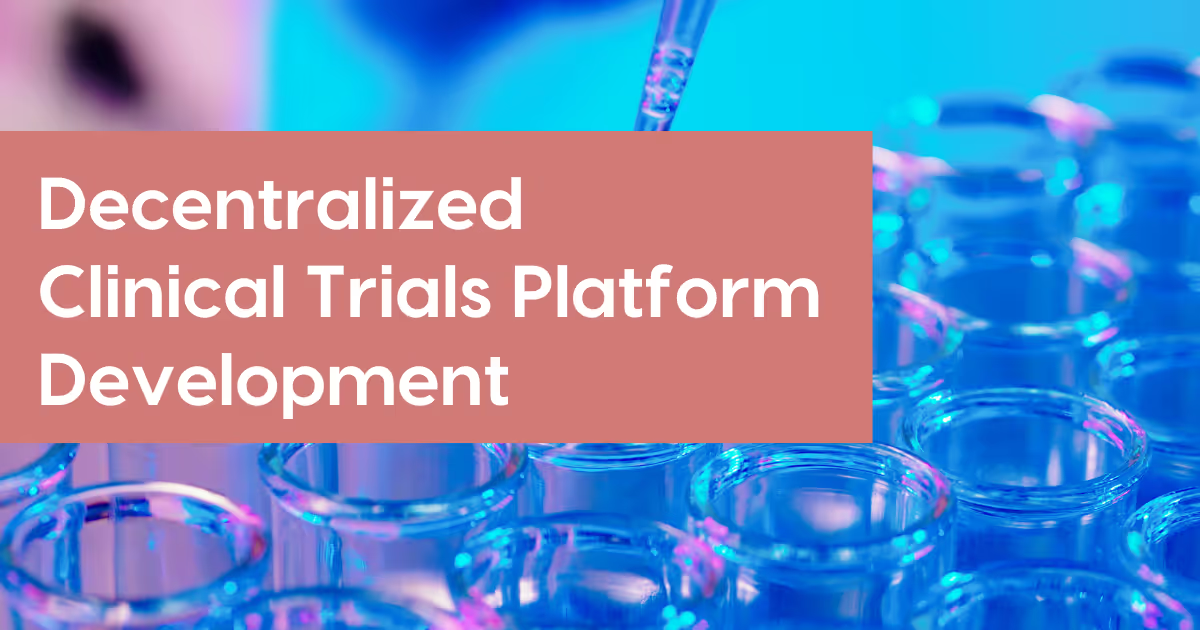
Decentralized Clinical Trials (DCTs) are an emerging approach to conducting clinical trials that utilize digital technologies to remotely monitor and collect patient data. DCTs offer numerous advantages over traditional clinical trials, including increased patient participation and retention, improved data quality, and reduced costs. However, implementing DCTs requires a robust technology platform that can securely collect and manage patient data.
At Fission Labs, we have a decade of experience in developing & delivering highly capable & patient-centric healthcare applications including decentralized clinical trial platforms for our clients, and in this article, we outline the key features and considerations for developing a decentralized clinical trials platform.
Key Features of the Decentralized Clinical Trials Platform
Patient-Centric Design
The platform should be designed with the patient in mind, providing a user-friendly interface and intuitive navigation. Patients should be able to access the platform easily, understand how to use it, and feel comfortable sharing their data.
Secure Data Collection and Management
Patient data is the foundation of clinical trials and must be collected and managed securely. The platform should have strong data encryption, access controls, and other security measures to ensure patient data is protected.
Remote Monitoring and Data Collection
The platform should support remote monitoring and data collection, allowing patients to participate in trials from the comfort of their own homes. This includes support for wearable devices, mobile apps, and other digital tools that can collect patient data.
Real-Time Data Analytics
The platform should be able to provide real-time data analytics, allowing researchers to quickly analyze patient data and identify trends. This can help researchers make informed decisions and adjust trial protocols as needed.
Integration with Other Systems
The platform should be able to integrate with other clinical trial systems, such as electronic health records (EHRs) and clinical trial management systems (CTMSs). This can help streamline data collection and management, reducing the burden on patients and researchers.
Transparency
The platform should provide transparency to all stakeholders, including patients, investigators, sponsors, and regulatory agencies. This can be achieved by using a distributed ledger, which provides an immutable record of all data and transactions. This allows for easy auditing and traceability, ensuring that all data is accurate and reliable.
Considerations for Decentralized Clinical Trials Platform Development
Regulatory Compliance
Clinical trials are heavily regulated, and the platform must comply with all relevant regulations, such as the International Conference on Harmonisation (ICH) guidelines and Good Clinical Practice (GCP) standards. This includes ensuring that patient data is collected and managed in accordance with relevant data privacy regulations, such as the General Data Protection Regulation (GDPR).
Scalability
The platform must be able to scale to support large-scale clinical trials with thousands of patients. This requires a robust infrastructure that can handle high volumes of patient data and support real-time data analytics.
Data Quality
The platform must ensure high-quality patient data is collected and managed. This requires a rigorous data validation process and the ability to identify and correct errors in real time.
Patient Recruitment and Retention
The platform must support patient recruitment and retention, including the ability to identify and engage potential trial participants and support patient retention throughout the trial.
Interoperability
The platform should support interoperability with other clinical trial systems, including EHRs, CTMSs, and other data sources. This can help streamline data collection and management, reducing the burden on patients and researchers.
Steps Involved in the Development of a Decentralized Clinical Trials Platform
Defining the Platform Objectives
The first step in developing a decentralized clinical trials platform is to define the platform objectives. This includes determining the target patient population, the data types to be collected, and the study endpoints. The platform objectives should be aligned with the research goals of the clinical trial.
Designing the Platform Architecture
Once the platform objectives are defined, the next step is to design the platform architecture. The platform architecture should be designed to support the secure and efficient collection of patient-generated data. The platform should also have the ability to integrate with existing electronic health records (EHR) and other clinical trial management systems.
Developing the Platform Infrastructure
The platform infrastructure includes the hardware, software, and network components required to support the platform architecture. The platform should be designed with a focus on security and privacy, including measures such as encryption and user authentication.
Integrating the Platform with Existing Systems
The decentralized clinical trials platform should be integrated with existing systems such as EHRs, clinical trial management systems, and electronic data capture (EDC) systems. This integration is critical to ensure that data is collected in a standardized and consistent manner.
Conducting User Acceptance Testing
User acceptance testing involves testing the platform with a group of users to ensure that it is user-friendly and meets the needs of patients, healthcare providers, and researchers. This testing should be conducted in a simulated environment to identify and address any issues before the platform is launched
Launching and Maintaining the Platform
The final step in developing a decentralized clinical trials platform is to launch the platform and maintain it over time. This involves ongoing monitoring and maintenance of the platform to ensure that it is functioning as intended and that any issues are addressed promptly.
Conclusion
Decentralized clinical trials offer numerous advantages over traditional clinical trials, but implementing DCTs requires a robust technology platform that can securely collect and manage patient data. Developing a decentralized clinical trials platform requires a focus on patient-centric design, secure data collection and management, remote monitoring and data collection, real-time data analytics, and integration with other systems. Key considerations include regulatory compliance, scalability, data quality, patient recruitment and retention, and interoperability. By addressing these key features and considerations, a decentralized clinical trials platform can help researchers conduct clinical trials more efficiently and effectively.
Content Credit: Mohit Singh



